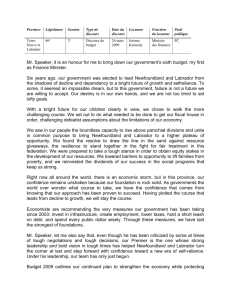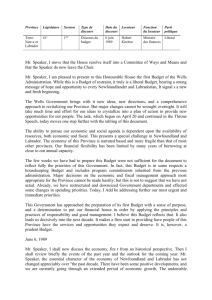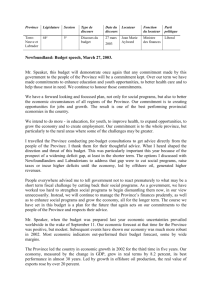Province Législature Session Type de discours Date du discours
advertisement
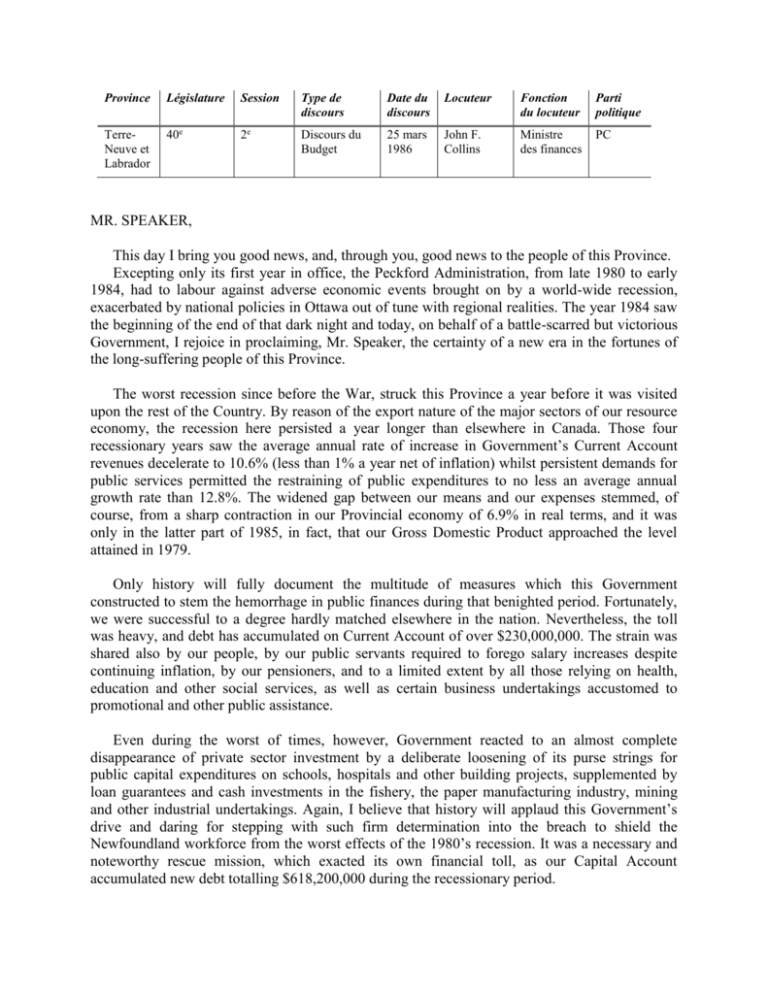
Province Législature Session Type de discours Date du discours Locuteur Fonction du locuteur Parti politique TerreNeuve et Labrador 40e 2e Discours du Budget 25 mars 1986 John F. Collins Ministre des finances PC MR. SPEAKER, This day I bring you good news, and, through you, good news to the people of this Province. Excepting only its first year in office, the Peckford Administration, from late 1980 to early 1984, had to labour against adverse economic events brought on by a world-wide recession, exacerbated by national policies in Ottawa out of tune with regional realities. The year 1984 saw the beginning of the end of that dark night and today, on behalf of a battle-scarred but victorious Government, I rejoice in proclaiming, Mr. Speaker, the certainty of a new era in the fortunes of the long-suffering people of this Province. The worst recession since before the War, struck this Province a year before it was visited upon the rest of the Country. By reason of the export nature of the major sectors of our resource economy, the recession here persisted a year longer than elsewhere in Canada. Those four recessionary years saw the average annual rate of increase in Government’s Current Account revenues decelerate to 10.6% (less than 1% a year net of inflation) whilst persistent demands for public services permitted the restraining of public expenditures to no less an average annual growth rate than 12.8%. The widened gap between our means and our expenses stemmed, of course, from a sharp contraction in our Provincial economy of 6.9% in real terms, and it was only in the latter part of 1985, in fact, that our Gross Domestic Product approached the level attained in 1979. Only history will fully document the multitude of measures which this Government constructed to stem the hemorrhage in public finances during that benighted period. Fortunately, we were successful to a degree hardly matched elsewhere in the nation. Nevertheless, the toll was heavy, and debt has accumulated on Current Account of over $230,000,000. The strain was shared also by our people, by our public servants required to forego salary increases despite continuing inflation, by our pensioners, and to a limited extent by all those relying on health, education and other social services, as well as certain business undertakings accustomed to promotional and other public assistance. Even during the worst of times, however, Government reacted to an almost complete disappearance of private sector investment by a deliberate loosening of its purse strings for public capital expenditures on schools, hospitals and other building projects, supplemented by loan guarantees and cash investments in the fishery, the paper manufacturing industry, mining and other industrial undertakings. Again, I believe that history will applaud this Government’s drive and daring for stepping with such firm determination into the breach to shield the Newfoundland workforce from the worst effects of the 1980’s recession. It was a necessary and noteworthy rescue mission, which exacted its own financial toll, as our Capital Account accumulated new debt totalling $618,200,000 during the recessionary period. With economic recovery in the United States, which saw its Gross National Product advance fully 10.5 Vo over the two-year period, 1983-1984, with the vital ingredient of a determined new management team in Ottawa as of September, 1984, and with the welcomed return of sanity in interest and exchange rate policies, the Newfoundland economy advanced 5.6Vo over the past two-year period, ending December, 1985. We stand today, therefore, at the outset of fiscal 1986, with the expectation of 2.7Vo growth in the Newfoundland economy, a low 3.5Vo inflation rate, probably a 10Vo real growth in our seminal fishing industry, a modernizing paper making industry in Central and Western Newfoundland, a secured offshore oil industry, and a strengthened service sector anticipating 2.5Vo real growth. In a word, Mr. Speaker, notwithstanding the unwelcome vicissitudes of recent international events, the solid base for the Newfoundland economy which this Government has laboured so hard to emplace is beginning to produce results which bid fair to accelerate at a pace unlikely matched throughout the long and varied history of our Island home and Labrador. FINANCIAL REVIEW AND OUTLOOK Mr. Speaker, let us at this stage review the financial progress of the Government itself during recent years, and that in prospect for the fiscal year ahead. This can probably best be capsulized by focusing our attention on the deficit status of our Current Account; the plotting of shortfalls in revenues against expenditures provides a useful graph for assessing our financial progress during these early post-recession years. The deficit for 1984-85 totalled $87,000,000 in round numbers, despite the vigorous application of a restraint program to all Government activities. During the year now ending, that is, fiscal 1985-86, I am happy to report to this Honourable House that the deficit will be down to $51,700,000 — over $21,000,000 lower than projected in the Budget estimates last May. Adjustments to revenue estimated by Federal authorities account for much of that welcome improvement, due in no small part to persistent efforts by ourselves and our counterparts in Ottawa. Table I outlines the details of our 1985-86 financial performance. I am equally delighted to report that we are projecting an even lower $49,300,000 deficit for 1986-87, down more than $23,000,000 from the deficit I felt necessary to project in the Budget I presented last May, and some $2,000,000 below the revised 1985-86 deficit I have just announced. Table II outlines the details of our 1986-87 financial position. Mr. Speaker, that is part of the good news promised at the beginning of my Address. Although unexpected additional expenditures were encountered during 1985-86, particularly for teachers’ salaries and various social assistance programs, our taxation, transfer and other revenues increased even more, giving the improved year-end results relative to the Budget estimate. Similarly, even though net expenditures during 1986-87 are projected to grow by 6.8%, Current Account revenues will grow by 7.1%, giving the lower deficit. In other words, we are beating the deficit problem that has plagued us since 1982, we have stepped off the “slippery slope” which was our fate for four trying years from 1981 onward, we have turned our Budget around through assiduous effort during the three most recent years we are considering. Let no one think that this happy trend of declining deficits has been achieved with ease or with luck, Mr. Speaker. With most careful and painstaking financial management; with pressing emphasis on economy and productivity in all our operations, whilst preserving those investments and promotions critical to economic and social development; with continued deferral to more affluent times of certain planned initiatives (such as construction of a new House of Assembly, car allowances for senior staff, particular new constructions, etc.); and, with relentless consultations and representations to the Federal Government pertaining to regional assistance which have met with considerable success, this Government, over the past three years, has employed the limited means at the disposal of the public purse to put in place a remedial budgetary process hardly matched anywhere else in Canada, by either the Federal or any provincial government. With continuing care, we will maintain and accelerate a hastening pace towards a fully balanced Current Account budget within the near future. GREEN PAPER ON HEALTH CARE Honourable Members are aware that, as part of our drive for rational funding of public services, Government published a Green Paper on health care expenditures late in the year and received over 60 submissions of recommendations and suggestions from the public in time for consideration during the Budget preparation. Of the four main options spelled out in the Paper for handling the health care system funding problem, none found favour with our respondents. Accordingly, I am pleased to announce that Government has readily accepted that verdict of the public — there will be no deficit financing of the health care system itself in this Province, we will not privatize major elements of the system, there will not be reductions in needed health services beyond Royal Commission recommendations, and no new forms of taxation or premiums will be levied to finance health. Rather, Government has embraced the majority opinion of respondents that Government should continue vigorous pursuit of its campaign to enhance cost-effectiveness, as laid out by the Royal Commission on Hospital and Nursing Home Costs, and should persist in active, innovative co-operation with hospital management and other authorities in the field to deliver ever greater services more effectively and at lowest unit cost. We are pleased that our policies in this area have been roundly commended by the public through their responses to the Green Paper. Particularly on behalf of my Honourable Colleague, the Minister of Health, Government formally extends its gratitude to all respondents for their thoughtful efforts towards their fellow citizens, and each will receive an individual reply now that Government’s decision is made known. FISCAL MEASURES Mr. Speaker, the second item of particularly good news I bring to this House and to the people is that Government has attained its notable budgetary success for 1986-87 with only small recourse to fiscal and revenue measures, the implementation of which will provide an additional $20,200,000 in 1986-87. • • • • • Government has decided it is no longer necessary to maintain the special stimulative reduction in Retail Sales Tax on building materials, temporarily instituted in 1982, with the result that the tax rate will return to the 12% level as in effect for most consumer items, effective immediately. The Insurance Premiums Tax will be replaced, at the same level, by a Retail Sales Tax on insurance, to take effect April 1st, 1986. This will be administratively easier to deal with and will affect only certain public corporations, but not individuals or private businesses. The relatively low taxation level on loose tobacco will be increased somewhat, yielding an additional 50c on a 200 gram tin, effective immediately. An increased markup by the Newfoundland Liquor Corporation on spirits will yield an additional $1,000,000 in profits, but there will be no increase in the Corporation’s markup on beer sales. And, certain fees will be increased modestly, including Motor Vehicle Registration, Drivers’ Licences, the Registry of Deeds, and tuition fees in vocational schools and colleges, the lastmentioned by 5%, not much more than the rate of inflation. EXPENDITURE PROGRAM Mr. Speaker, I have been pacing myself somewhat impatiently in getting to this next section of my good news Address. The Estimates for the coming fiscal year provide increased funding amounts for a wide range of needed ongoing public services and programs, and reflect our assessment of the most cost-effective use of our financial resources. It is my pleasure now to announce the more significant items of public interest, on which my Honourable Colleagues, the Ministers of the Departments concerned, will elaborate later. Pensions An annual increase of 4%, with a floor of $240, is approved for all individuals receiving Government pensions, effective April 1st, 1986. Education I am pleased to announce that a 6% increase in per pupil operating grants is provided to all school boards and the special grant to compensate for lost revenues related to declining pupil enrolments is continued. With the continued decline in interest rates, the special temporary interest subsidy introduced when rates were extremely high a few years ago will be eliminated, but I am pleased also to announce that an additional $1,000,000 will be distributed, on the basis of greatest need, to boards primarily serving rural areas of the Province. The $20,000,000 per year school construction program is extended beyond the three-year period initially announced to include a fourth year in 1988-89. Post-secondary Education As indicated recently, projects totalling $34,000,000 have been approved from the Federal/Provincial Offshore Development Fund, specifically: $25,000,000 for a Centre for Earth Resources Research at Memorial University; $1,000,000 for a computer-aided design facility at Memorial’s Engineering School; $5,000,000 for an Offshore Survival Training Centre for the Marine Institute; and, $3,000,000 for equipment for Occupational Trades Skills Training at the College of Trades and Technology and at various vocational schools. Cash flows on these projects in 1986-87 will be $10,500,000. Let me announce three further significant expenditures for post-secondary education: • • • First, Memorial University’s operating and furnishings/equipment grants, on which the Honourable Minister concerned will later comment more fully. These grants are increased overall by 9.6Vo, one of the largest increases in the Budget, to a total of $78,900,000; $2,000,000 out of a total $5,100,000 for the School of Fine Arts at the Sir Wilfred Grenfell College in Corner Brook — further evidence of this Government’s strong commitment to the Arts; Initial funding of $1,000,000 for a $3,000,000 extension to the Faculty of Business building at Memorial University. Job Creation It is my privilege now to announce the main components of our shortterm job creation program for the year ahead: • • • • $2,000,000 for a Student Summer Employment Program in conjunction with the Federal “Challenge ’86” Program; A total of 770 seasonal jobs in silviculture activities through the Department of Forest Resources and Lands and in co-operation with the pulp and paper companies; $3,500,000 as our share towards the $35,000,000 Canadian Job Strategy Program; $27,000,000 for the Community Development Program in the Department of Social Services which will create up to 12,000 shortterm jobs in 1986 as happened in 1985. Municipal Assistance I am pleased to announce a recent decision which Government has taken with respect to municipal assistance to the City of Corner Brook. It has been decided that Government will reimburse approximately 15% of the annual fire protection costs of the City of Corner Brook in order to compensate for the costs of fire protection for non-taxable Provincial Government properties within the City’s boundaries. Additionally, Government is increasing its municipal firefighting equipment allocation to $750,000, representing a $230,000 increase over 1985-86, to assist municipalities to acquire essential new equipment under this 75/25 cost-shared program. Health In the area of health care, Government is announcing significant expenditures to improve services in all areas of the Province: $6,000,000 for the Burin Peninsula Hospital; $4,500,000 to commence construction of the $16,000,000 redevelopment of the Grand Falls Hospital; $1,800,000 to construct an extension for outpatients and ambulatory care at the Baie Verte Hospital; Funding to enable the Clarenville Hospital to become operational this year; Construction funds totalling $3,700,000 to commence the new 75-bed chronic care/clinic facility at Botwood; Funds have been provided through the Newfoundland and Labrador Housing Corporation for a total of 105 new chronic care beds to be added to the Agnes Pratt Senior Citizens Home in St. John’s and the Golden Heights Manor Home in Bonavista; Funding for the operation of the following new chronic care facilities: the 75-bed Lion’s Manor Senior Citizens Home, Placentia; the 40-bed Harbour Lodge extension, Carbonear; and, the 50-bed extension to Bay St. George Senior Citizens Home; Funding to provide for 40 new staff positions in existing nursing homes around the Province to upgrade nursing care, a 4% increase in the rates to licenced boarding home operators and $200,000 for additional boarding home beds. • • • • • • • • Social Services It is a pleasant duty to announce significant expenditures for improvements in the social services area: • • • • • A 4% increase is provided for all components of the Social Assistance Program to take effect April 1st, 1986; Five additional group homes are funded for various categories of children in need; $150,000 is allocated for assistance in purchasing a new “Good Will Centre” building in St. John’s; $145,000 is allotted for a physically disabled group home to be operated at the Orange Home; Three new group homes and a specialized open custody group home for young offenders are funded; • $450,000 is assigned to begin development of a new closed custody facility for young offenders. Fishery It is my pleasure now to outline major initiatives for our fishery: • • • • • • • A new type of middle distance fishing vessel will be designed at Marystown Shipyard Limited, which will construct one new such vessel, and will participate with other local shipyards in the construction of a second new middle distance fishing vessel. These two vessels will operate in conjunction with the two existing middle distance vessels owned by the Department of Fisheries, purchased for pilot program purposes; Over $400,000 is provided for an expanded aquaculture development program, and as well a Retail Sales Tax exemption is granted on certain equipment and materials used in commercial aquaculture operations; $350,000 has been supplied for expanded departmental quality and productivity enhancement programs; $6,500,000 will be supplied through the Fisheries Loan Board for loans and other assistance to the inshore fishery; $3,000,000 is provided for completion of the Marine Service Centre in Green Bay and for a new straddle crane and related wharf facilities at Harbour Grace; An additional $1,300,000 over that expended in 1985 will be spent on other fisheries infrastructure; $2,400,000 is provided as the Province’s portion of an $8,000,000 contribution from the Burin Peninsula Development Fund towards the expansion of the secondary processing facility and the construction of the trawler refit centre at Burin by Fishery Products International. Small Business It is especially exciting to announce new thrusts for small business promotion: • • • The limit on Rural Development Authority loans has been doubled to $50,000, and the limit for the Farm Development Loan Board has been increased from $30,000 to $75,000. In both cases, preferential interest rates are maintained at three points below bank prime. The Agriculture Development Fund has been boosted to $1,300,000 for 1986-87 so that our farmers can improve buildings, breeding stock, and land development; An allocation of over $1,000,000 has been provided to the tourism advertising budget, aimed particularly at Eastern Canadian and Northeastern United States markets. This more aggressive promotional campaign is expected to result in an additional $10,000,000 in tourism expenditures in the Province. In addition, the Tourism Development Subsidiary Agreement is expected to inject $5,000,000 into the industry this year, levering a further $12,000,000 from the private sector, for improved tourist facilities and attractions in the Province; We are prepared to support financially a new private business engaged in car wreck and metal recycling in the Province this year, which will have highly desirable environmental spin-off benefits; • The incubator mall at Pasadena will be brought to completion and planning is in its final stage to allow commencement of the Port-aux- Basques incubator mall. This will be complemented by the newly opened Federally sponsored Innovation and Entrepreneurial Management Corporation (TIEM) Enterprise Centre in St. John’s. Forestry The Budget includes several initiatives aimed at strengthening the contribution made to our economy by the forestry sector. Over $27,500,000 is provided for forest resource management programs including more than $11,000,000 under a new forestry agreement with the Government of Canada expected to be signed in the near future, and $3,500,000 for spraying against the hemlock looper insect under cost-sharing arrangements with the paper companies. Also cost-shared with the paper companies and with the Government of Canada is the $248,000,000 pulp and paper modernization agreement, and in 1985-87 our Provincial contribution is $1,500,000. For forest fire protection, $8,700,000 is allocated towards the acquisition of the Province’s new fleet of waterbombers being built under the Federal/ Provincial National Air Tanker Fleet Program. Mining This Government has regularly displayed a lively concern for the welfare of the mining industry in the Province, and for those gainfully employed in mining, as witnessed by our prompt response to family hardships in Labrador West when recession-dictated layoffs occurred there, and as witnessed by our successful efforts in recent years to stimulate exploration in all areas of the Province. That policy is being maintained with high priority, as the following announcements demonstrate: • • • $2,700,000 will be spent to promote and support mineral exploration and development under the Canada/Newfoundland Mineral Development Subsidiary Agreement; The Budget contains an equity investment of $6,000,000 for Baie Verte Mines Limited, the first instalment of a total $12,000,000 investment to maintain efficient operations with resulting jobs over the long-term; The Budget also includes $1,300,000 from the Burin Peninsula Development Fund for the reactivation of the St. Lawrence Fluorspar Mine and construction of an onsite processing mill, making it a more advanced enterprise than the previous mining operation. • Offshore Development I am pleased to announce today the formation of a partnership between Marystown Shipyard Limited and Moss Rosenberg of Norway. This new partnership, to be known as Viriland Industries, will pursue major contracts relative to the construction of the gravity based structure and associated work stemming from the Hibernia development. Moss Rosenberg is one of the most capable and technically advanced offshore contracting firms in the world and we are confident that this “marriage”, coupled with our earlier technology transfer agreement, will enable Marystown to become a significant player in this exciting new development. In addition to the cash flow for the Offshore Development Fund projects referred to earlier, a further $29,500,000 is provided under the Fund for other initiatives and projects to be announced in conjunction with the Government of Canada during the year. Construction Industry The construction industry is of vital importance in our Provincial economy, not least because of its capacity for rapid response in enhancing rates of employment, given appropriate financial and market conditions. Many sectors, such as housing, transportation and others, influence the level of construction activity. Accordingly, with employment opportunities largely in mind, Government is particularly gratified to be able to make the following announcements: Gross capital expenditures by the Newfoundland and Labrador Housing Corporation (NLHC) will exceed $78,000,000 in 1986-87, and amongst the projects funded will be industrial land developments at the Octagon Pond, Donovans, O’Leary Avenue, and Springdale industrial parks and several other areas for a total of $3,600,000, and $4,500,000 to upgrade corporation-owned market rental units in St. John’s, Stephenville and Goose Bay; • The Provincial road and bridge construction program comprises the following three initiatives: • The highway and bridge rehabilitation program will be continued and $13,700,000 has been provided for the coming year; • Over $22,000,000 is provided for highway improvement and construction projects; • $4,300,000 will be spent on bridge and causeway projects; • Spending under the Canada/Newfoundland Highway Funding Agreement will increase in the new fiscal year to $33,600,000, primarily for the Trans Canada Highway and the Trans Labrador Highway, but also including some secondary road construction; • $8,000,000 will be spent under the Coastal Labrador Air Strip Program; • $3,800,000 will be spent to continue construction of a new Department of Transportation depot at Deer Lake, the final cost of which will be $5,700,000 when completed in 1987; • $300,000 is allocated for planning and site work for a new $1,100,000 depot at Baie Verte; • During the coming fiscal year, $25,000,000 will be made available through new guaranteed loans to enable municipalities to provide water and sewer services and to construct and pave roads; • $2,000,000 will be expended out of the recently signed $7,500,000 Canada/Newfoundland National Conservation and Alternative Energy Initiative Agreement with emphasis on labour-intensive demonstration projects and wood-chip fuel priorities; • A total of $1,800,000 will also be spent on energy conservation projects for public buildings. Mr. Speaker, I believe that Honourable Members without exception will agree that what I have just read constitutes indeed a “Good News” message, especially for those employed and unemployed who are striving to participate in work activities for the improvement of their • standards of living. As the year ahead unfolds, Government will continue to search out every possible opportunity to create and stimulate gainful employment in all areas of our Province. CONCLUSION Mr. Speaker, the best news of all, in Government’s view, may be distilled from my concluding remarks. Let me first state that, in the minds of some people, it may appear unusual to present this type of “Good News” Budget at such an early stage in the renewed mandate of any Administration. The tone of the Budget may be more reminiscent of the closing days of a Government’s mandate. If such perceptions exist, they can be readily dispelled. The tone and good news in today’s Budget bears no relationship to this Government’s time in office, but, rather flows directly from past performances of the Administration and from economic circumstances, current and in early prospect. Mr. Speaker, I submit it is a fair assessment to say that if one single trait is characteristic of the Peckford Administration, that trait is a propensity for, and a belief in, forward planning. We have initiated studies, established Royal and other commissions, published White, Green and other papers, appointed councils and task forces, and partaken of conferences and consultations on the widest possible range of activities appropriate to Government’s attention. Indeed, we have sometimes been criticized for words and not deeds. However, we believe it axiomatic that rational, definitive planning is a prerequisite of success, contributing in no small measure to our good news Budget today. Of course, we also recognize that other events contributed importantly to our present circumstances. There is alive and well throughout Canada today a self-image of confidence and optimism, standing in stark contrast to the confusion and doubt so prevalent in the era of “stagflation” which epitomized the 1970’s and early 1980’s. In those days, Canada was beset with regional antagonisms, management improvisations, and confused objectives of awful proportions. Incoherent government interventions, particularly at the National level, in all manner of activities were rife, frequently for less than noble purposes. A radical sweeping aside of time-encrusted methods of governmental activities and interactions with other societal players was urgently needed, and the prescient insight of the Canadian electorate achieved that handsome result in the latter part of 1984.1 believe the most biased observer will now agree that West talks to East, all sectors have resumed the pursuit of invention and productivity, and the multiple challenges of our time are being faced by all segments of society with vigour rather than dread. Our Province is sharing visibly in this new Canadian awakening, and, indeed we have our own social rejuvenation dating a decade beforehand. Newfoundlanders now occupy a respected and enlarging place in the Canadian society; we have not as yet seen that develop into equivalent economic prosperity or comparable public services. However, the point we insist upon, as a Government, is that the stage is now set for the attainment of a new plateau. On all sides, our sectoral economy and our social arrangements are solidly poised for “take-off”. Who can doubt that our fishery has found its feet, realizing the success of the restructured offshore division, and the aquacultural and other innovative stirrings of the inshore? Despite temporary dips in petroleum prices, can there be any doubt that our proven offshore treasures will see early development? Can the further unlocking of Labrador hydro potential be long delayed considering the new realities in Quebec and the mounting appetite for electrical energy in Eastern Canada and the Northeastern United States? Will not the present hectic pace of mineral exploration throughout our Province bring new bounties to rival past developments? Can the rapidly escalating skills and educational status of our population fail to find early outlets of attainment and standard of living? Are Newfoundlanders now not immeasurably better ordered in their community organization, artistic attainment and social stability? The answer to all these questions is more confidently affirmative than at any other stage in our history. There is no doubt, Mr. Speaker, that Canada is on a forward move, and the good news is that Newfoundland and Labrador is about to match the marching pace.
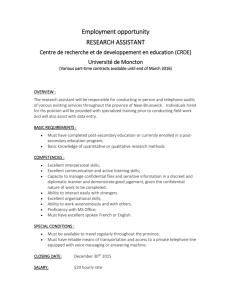
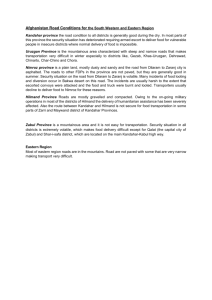


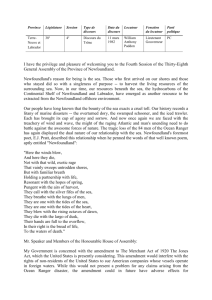
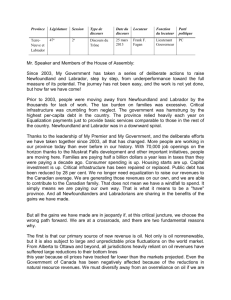


![Social and Economic Spatial Analysis [PDF - 5MB]](http://s3.studylib.net/store/data/008784515_1-872e4c0e166242945299604069b80fd8-300x300.png)
